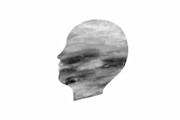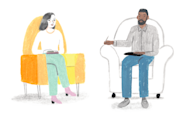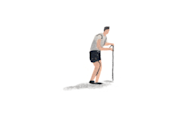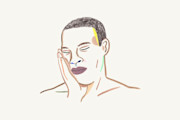In the summer of 2021 gymnast Simone Biles dropped out of an Olympic competition to protect and prioritize her mental health. Her decision came on the heels of tennis star Naomi Osaka’s refusal to attend a press conference because, as she candidly said, doing press had hurt her mental wellbeing.
The backlash toward both women for prioritizing their mental health was swift. Members of the media said Biles was “selfish” for withdrawing from competition. Osaka was called “narcissistic and petulant.”
But there were those, who, more than simply feeling sympathetic, knew well what these powerful athletes were facing. Chief among them: Olympian Alexi Pappas.
Victory and defeat
In late 2016 Alexi Pappas should have been on top of the world. She had just achieved a monumental feat—becoming an Olympian, competing for Greece in the women’s 10K and setting a new national record.
It should’ve been one of the best times of her life. Instead, it was one of the worst.
After the 2016 Olympics, the comedown from her achievement collided with a wave of other changes in her life, triggering an aching, buzzing, relentless panic. She made hasty decisions, practically stopped sleeping, and, disastrously, sustained a serious injury from forcing herself to train through it all.
One glance at her long list of accomplishments is enough to tell you Alexi is driven beyond belief. Her drive had propelled her—but at times, it had come from a dark place. “I don't think I realized until I had that post-Olympic depression,” she says, “just how much I was fueled by trying to solve an internal problem with an external solution.”
When Alexi was four years old, her mother, Roberta, died by suicide.
“I had this assumption that [after] the ultimate external accomplishment of the Olympics,” Alexi says, “I would feel a distinct shift in the void I’d felt since losing my mom. And it didn’t fix what I felt.”
It was a challenging realization to come to. “I think it can be really hard to see,” she says, “partly because it is so motivating to be fueled by trauma, so it’s hard to see until it stops working.”
She also felt guilty for feeling unhappy at all. When she stood back and looked at her life, all she could see were triumphs and possibility. “I had a lot of those secondary emotions of, ‘I shouldn't feel this way.’”
The reality of mental injury
Floundering in the wake of the Olympics, Alexi found painful insight into her mother’s experience, and into the broken way the world around her viewed mental health.
“What I didn't understand is that your brain can be fatigued and injured,” she says. And “because that idea wasn't in my vocabulary, and it wasn't something that the world around me seemed to embrace, I had trouble accepting what I was feeling as real, or as okay.”
Alexi tells Monarch she thinks we “still have a long way to go in the world with understanding,” the reality of how mental health injuries work—including the ones that can ultimately lead a person to end their life.
In her opinion, one of the most important steps we can take toward potentially life-saving understanding is learning to trust one another, and to trust ourselves.

Why is trusting others important?
As a culture, we are working toward understanding that mental health is health, and that a mental injury can be just as serious as a physical one. This was evident in the outpouring of support that Biles and Osaka received from some pockets of the world.
But to Alexi, those louder voices of critique were doubting the lived experiences of two young women under enormous pressure. “I was sad that people just didn’t take what [Biles] said at face value,” she says. She wishes others had felt that, “if this person thinks they’re going to put themselves in a compromising situation, it’s enough that they said it.”
We must be able to trust one another, so that when someone says that something is wrong, we believe them without demanding proof.
How to develop self-trust
And we must be able to trust ourselves. When something doesn’t feel right, don’t dismiss it. Pushing yourself to ignore your emotions and reactions is the kind of “forced feelings'' approach that Alexi says her therapist has helped her move past.
“My doctor guided me to focus on my actions, which would change my thoughts, which would change my feelings. I became much more empathetic toward myself, and also tried to hone in on my actions, rather than trying to force feelings that I couldn't change.”
It was this approach that helped her climb her way out of the lowest point of her life.
For an elite athlete like Alexi, listening to her body is paramount to staying competitive and safe. After the 2016 Olympics, refusing to listen in an attempt to stonewall her depression resulted in serious injuries to her hamstring, back, and mind.
Alexi also points out that it’s important to trust yourself when a particular treatment plan or provider isn’t helping.
And yet, choices for mental health treatment are often sparse and inaccessible enough that walking away from one therapist can mean struggling to find another.
Even for Alexi, securing consultations with therapists required, “near Olympic feats. It was impossible to get an appointment. I had to ask for favors, it was crazy, honestly. It was really difficult to get help.”
Can intuition save lives?
The more she discovered about her mom’s treatment for depression, the more Alexi saw how heavily the “forced feelings” approach factored in. She knows it would never have worked for her.
“I don't think she was ever in an environment or in a time in the world to learn about mental health.”
Many of us learn not to trust our own bodies and minds. In what’s known as medical gaslighting, women—in particular Black women—and other members of minority groups are often denied treatments by professionals who don’t trust and believe them, or who cannot separate a sick person’s needs from their own perceptions of them.
“It became clear,” Alexi says, that the way her mother was treated, “would have really made things quite a bit worse. It was a lot of forcing feelings over actions, and not allowing her to remove certain labels, identities, responsibilities. And not seeing it as a real injury, but more as a choice.”

Increasing our understanding of mental health
Today, Alexi approaches maintaining her mental health with the same world-class rigor she does training her body.
She also works to share what she’s learned as widely as possible, in everything from her filmmaking to her Instagram captions. “It’s so joyful when you can connect with people in that way. And I think for my own mental health, it’s healthy because I want those connections.”
She says she doesn’t want anyone to repeat the kinds of experiences that she and her mother went through, and that mental health advocacy helps her feel close to her mom.
“It’s a way to be connected to her. When I think about her, I’m like, “Yeah, we’re friends now. And we’re fine.”
Thinking about where she’d like to see our understanding of mental health go next, Alexi says the next step is: “Not questioning when people say that something is needing attention, or they need a pause. That has to be enough.”
By promoting trust, of each other and for each other, we can bypass barriers to seeking care in a way that, for some, can make all the difference.
“Those are kind of positive feedback loops to each other. Because if we trust people more, then people will trust themselves more.”
What to do if someone you know exhibits warning signs of suicide
If someone you know is dealing with suicidal thoughts, there is help. Here are some important reminders.
Do not leave the person alone
Remove any firearms, alcohol, substances or sharp objects that could be used in a suicide attempt
Text TALK to the Crisis Text Line at 741741 or
Call the National Suicide Prevention Lifeline at 1-800-273-TALK (8255)
Take the person to an emergency room or seek help from a medical or mental health professional
Here are some additional resources:
The American Foundation for Suicide Prevention has over 50 local chapters across the country with local support for those considering suicide and their loved ones.
The Suicide Awareness Voices of Education (SAVE) foundation provides resources for those who have survived a loss by suicide.
Concerned you might be depressed?
Take our online depression quiz to determine whether you are experiencing symptoms of depression. It's free, quick, confidential, and clinically validated.
READ NEXT: Alexi Pappas' Key Tips on How to Find the Right Therapist Fast
Need to find a therapist near you? Check out the SimplePractice Monarch Directory to find licensed mental health therapists with availability and online booking.






